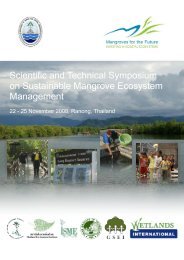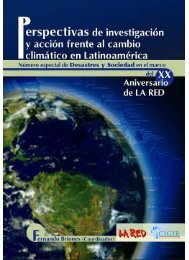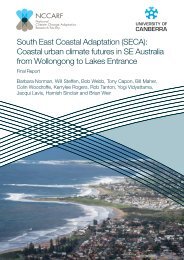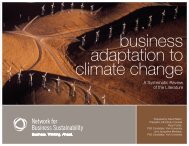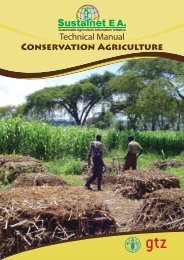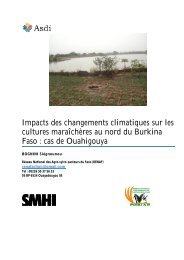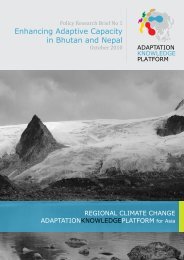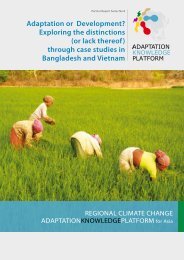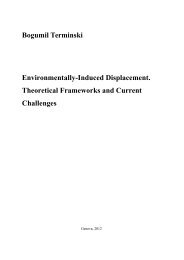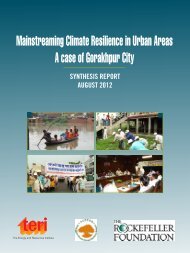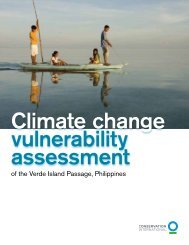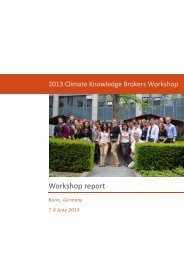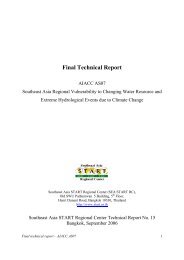Urban food security, urban resilience and climate change - weADAPT
Urban food security, urban resilience and climate change - weADAPT
Urban food security, urban resilience and climate change - weADAPT
You also want an ePaper? Increase the reach of your titles
YUMPU automatically turns print PDFs into web optimized ePapers that Google loves.
its Food for All project. This helped local councils integrate <strong>food</strong> <strong>security</strong>measures into their other statutory planning responsibilities.Elsewhere, planning for local <strong>food</strong> <strong>security</strong> is minimal <strong>and</strong> more likely to be theproduct of efforts by local non-governmental organisations <strong>and</strong> charities. Theseinclude community gardening groups, permaculture organisations, schoolgardening initiatives, local producer organisations <strong>and</strong> traditional gardeningclubs.Many of those interviewed spoke of the need to join up local, small scaleinitiatives to help build more sustainable city-wide <strong>food</strong> systems,I’ve realised that the next step beyond an individual’s isolated <strong>food</strong> forest is tohave many of these linked up. To have a sense of community where peopleshare their produce. They all grow different produce, <strong>and</strong> share it betweenthemselves. That evens out any sort of fluctuations in species, weather, <strong>climate</strong>conditions <strong>and</strong> everything else. It creates a more resilient production system.(Melbourne backyard gardener)There is also a recognised need to improve the general awareness of <strong>food</strong> among<strong>urban</strong> populations,There’s a real need for <strong>food</strong> literacy – we need a population that can be so muchbetter educated about where <strong>food</strong> comes from, how it’s grown, <strong>food</strong> chains <strong>and</strong>so on. (Food researcher)RecommendationsTo help improve the productivity <strong>and</strong> quality of <strong>food</strong> grown in cities, detailedlocal studies of soil quality, the impact of airborne pollutants, waterrequirements <strong>and</strong> crop yields could provide great benefit in developing moredetailed downscale projections of the impacts of <strong>climate</strong> <strong>change</strong> on <strong>food</strong>growing potential, in particular cities <strong>and</strong> <strong>urban</strong> areas.If integrated <strong>and</strong> comprehensive plans for building <strong>urban</strong> <strong>resilience</strong> aredeveloped in Australia in similar ways to those now being implemented in othermature cities, then the potential of <strong>urban</strong> agriculture can be further enhanced.However, if <strong>urban</strong> agriculture is seen mainly as a marginal preoccupationamong a green or metropolitan middle class minority, then many of the currentbarriers to its expansion will remain <strong>and</strong> it will not be capable of making a moresignificant contribution to greater <strong>urban</strong> <strong>resilience</strong>.The results of this work can make a number of valuable contributions:to the development of the National Food Plan currently being prepared by theDepartment of Agriculture, Fisheries <strong>and</strong> Forestry, especially in relation to itsconcerns about <strong>climate</strong> <strong>change</strong> impacts, adaptation <strong>and</strong> mitigation;to national debate about <strong>urban</strong> <strong>food</strong> <strong>security</strong> <strong>and</strong> <strong>urban</strong> <strong>resilience</strong>; <strong>and</strong>to local debates about the development of more effective policy frameworks tosupport <strong>urban</strong> agriculture.<strong>Urban</strong> <strong>food</strong> <strong>security</strong>, <strong>urban</strong> <strong>resilience</strong> <strong>and</strong> <strong>climate</strong> <strong>change</strong> vi



